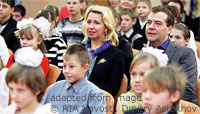To be or not to be: Buried within the adoption scandal is a bigger and more essential dilemma

(Moscow News – themoscownews.com – Anna Arutunyan – January 14, 2013)
Anna Arutunyan is the politics editor of The Moscow News
“Children are [expletive] sacred,” one protester was overheard telling another at Sunday’s March against Scoundrels.
That was one of the reasons that the march, widely expected to continue a trend of dwindling turnout for the spate of mass anti-government rallies that began a year ago, drew a visibly larger crowd.
That adoption and Russia’s hundreds of thousands of orphans and abandoned children became a theme for the latest political demonstration made the event itself deeply primordial.
The so-called Dima Yakovlev Law, which bans Americans from adopting Russian children, has hit a nerve at the pre-political level, the equivalent of driving a nail into an electric cable underneath your wall’s shoddy plaster, with the same potentially catastrophic consequences.
This issue deserves a closer look, because it reveals a gaping insecurity that, despite the political divide between the “scoundrels” and the white-ribboned “children of light,” is shared by both Vladimir Putin and your average Bolotnaya Ploshchad hipster.
By now, we’re all familiar with the numbers: the purportedly nonpolitical rationale for the adoption ban, cited by its proponents, is that 19 Russian children died while in the care of American families since 1998.
But between 1991 and 2005, 1,220 children died while in the care of Russian adoptive families, according to 2006 figures from the Moscow office of the Ombudsman for Children’s Rights. This is a disputed figure, and we should take some care with it: most of these children didn’t die of abuse, but suffered accidental deaths, whether due to neglect or not isn’t clear. Still, they presented the media with a horrifying statistic: considering that Russians adopted over 133,000 between 1993 and 2007, Russian orphans and abandoned children were approximately 22 times more likely to die with Russian families than with American ones.
Again, we need to take this number with a very generous grain of salt. Yet what it points to, and what can hardly be disputed, is that people in Russia whether they are children, adults, businessmen or journalists have a higher chance of dying, period. If America (which, by the way, has one of the highest mortality rates among developed nations) has a death rate of about 8 per 1000 people, in Russia it’s 13.
We all have to ask ourselves a very uncomfortable question which doesn’t really have an honest answer: why are we raising our children here, where, even in the relatively second-world setting of Moscow, there is so little sun, where the climate is dismal, where you spend so much energy simply staying warm that being productive doesn’t even seem worthwhile?
With this existential question looming in the background, any adoption ban in Russia will be primarily a political problem. By banning American adoptions, Putin has essentially decreed that a certain number of Russian children will statistically die that’s the dreadful conclusion drawn by enough people to bring them back to more protests in the freezing cold.
But it also means that Putin has an impossible problem, one that has broken many Russian rulers before him: once it has become clear he can’t remake Russia into what it is not, he acts as though the feat has already been accomplished.
I have heard many Russian officials deceive themselves this way: just one last effort, and Russia will be like Sweden, tomorrow. Incidentally, it’s the same self-deception that, time and again, starts in a fluster of idealistic top-down reforms and ends in a repressive iron curtain (if you don’t love Russia, then Russia loves YOU).
This was the reason he Russian president was so upset over the Magnitsky Act and over the flurry of questions about the adoption ban: they are indeed connected, because Russian officials take their money, their vacations, and their children to where it’s safer and warmer.
And here’s the bitter irony, all the more bitter because there’s not much to be done about it: despite the growing anti-Western sentiment, the chief unspoken qualm of the protest movement that began a year ago is that the Kremlin, despite talking the talk, has failed to make Russia into a different country.
That’s what we’re all really upset about. And that’s what Putin is upset about so upset that he has forbidden Russian orphans from going to America. Because children are [expletive] sacred.
